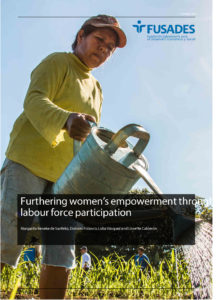This research paper, commissioned as part of the series ‘Starting Strong: the first 1000 days of the SDGs’, identifies key actions toward addressing the unfinished business of the MDGs and how to reach those who are furthest behind in relation to the new SDGs.
 Latin America has experienced rapid progress in female labour force participation (LFP) over the past three decades. LFP increased rapidly in the 1990s, but has stagnated since 2000. In 2014, 58% of women participated in the labour market, compared to 84% of men (World Development Indicators). Participation rates and trends vary widely across countries and amongst groups of women. Participation is lower among poorer groups (who are often rural and indigenous), the less skilled, older women (over 54 years old) and the young (18- to 24-year-olds). If the goal of ‘leaving no one behind’ is to be achieved, special attention needs to be given to the needs of these vulnerable groups.
Latin America has experienced rapid progress in female labour force participation (LFP) over the past three decades. LFP increased rapidly in the 1990s, but has stagnated since 2000. In 2014, 58% of women participated in the labour market, compared to 84% of men (World Development Indicators). Participation rates and trends vary widely across countries and amongst groups of women. Participation is lower among poorer groups (who are often rural and indigenous), the less skilled, older women (over 54 years old) and the young (18- to 24-year-olds). If the goal of ‘leaving no one behind’ is to be achieved, special attention needs to be given to the needs of these vulnerable groups.
Regulatory frameworks identified in Latin American (LA) countries do not impede gender equality in the labour force. The observed differences are likely to result from other restrictions, including cultural norms regarding women’s roles as caregivers, household responsibilities and discriminatory practices.
Insufficient education and training, as well as time limitations, are the main obstacles that women face in joining the labour market. These factors are more constraining for vulnerable groups.
Programmes and policies should aim to reduce barriers to labour market participation, especially through active market interventions. Programmes tend to be most effective when they tackle more than one restriction faced by participants; coordination and communication among actors (e.g. different government agencies, service providers, local and international non-governmental organisations (NGOs), etc.) are required to avoid duplication of effort and to achieve greater synergies. Priority – as well as subsidies and incentives – should be given to vulnerable groups.
Programmes and policies should be rapidly expanded to reduce constraints on women’s time. This includes: a) aiming for universal access to initial childhood care and pre-primary education, and b) increasing the availability of community-based childcare facilities and supporting caregivers for the elderly and disabled. Governments should incentivise the supply of care services, and should subsidise users who cannot cover costs.
The launch of the new Sustainable Development Goals (SDGs) has generated heightened awareness regarding women’s economic empowerment. Early actions that reduce the constraints women face in the workforce can help achieve these SDGs
The ‘Starting Strong’ series is a collaborative partnership to initiate a wider conversation around priority actions for the first three years of the SDGs – just over 1000 days – with relevant stakeholders with a regional focus.
The authors are affiliated with Fundación Salvadoreña para el Desarrollo Económico y Social (FUSADES), El Salvador.

